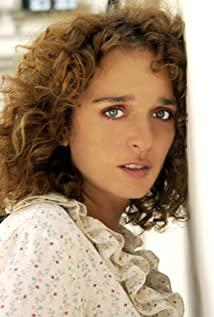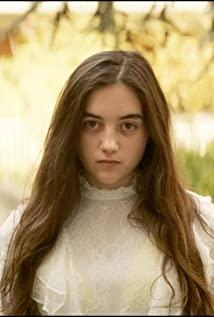"Portrait of a Burning Woman", the title of the story heralds destructiveness, about the lover having to separate, and the poetry aroused by the sudden stop.
1. to look at
The painter was probably hit when he looked at Eloize head-on for the first time. The mysterious blonde woman in front of her eyes, showing the same hue as the sea that backs her, blue and pure. When the painter observed her, she glared back at the painter, without saying a word, full of doubts.
Returning from the beach, the painter counted the distance between today’s observation results and the goal: “I have to get close enough to her to portray her soft earlobes and the hair that covers the tips of her ears...they present a warm and transparent tone. . And the ear holes in the middle are thicker in color... Under the light, her cheeks become the brightest part of her face..." Then she confessed unexpectedly, "(She) makes people unable to look away."
In sneaky gazes, pretending to be inadvertent observations,
The painter really lost his basic professional qualities, that is, he should not have a certain feeling for the objects he sketched from life.
A kind of drama: beginning with "eyebrows and eyes", "big eyes and small eyes", falling in love.
It seems inevitable: scorching eyes. Whether the painter is staring straightforwardly and carefully, or Eloise looks back purely and arrogantly, how can human beings bear the weight of the gaze? Everything will slip out of the eyes, magic, secrets, poetry.
2. look back
At night, the maid Sophie, Eloize, and the painter sit around the table. Eloize reads an ancient Greek myth, Orps and Eurydijk
——The infatuated Orps came to the underground mansion and begged the gods to resurrect his dead wife,
The gods were moved and agreed to his request, but with one condition:
Before leaving the junction of yin and yang, you must never look back at his wife, otherwise the promise will be invalidated.
"On the verge of touching the border
Full of nostalgia and dissatisfaction for his wife
The infatuated person looks back with love and pity
... "
Sophie interrupted: "No, he can't turn around because he misses and doesn't give up! This reason is not valid, and someone else specifically told him that he can't turn back."
Eloize asked in return: "How can he bear it because of his deep affection?"
At this time, the painter interrupted, and she offered a very novel point of view:
"He can hold it back, but he looks back for another reason.
Maybe he made a choice...
He chose Eurydijk's memories, which is why he wants to look back.
This is not a choice as a lover, but as a poet . "
Eloyz glanced at the painter thoughtfully, and continued reading:
"She said softly the last farewell was already a farewell, which could hardly reach her lover's ears, and then she fell into the abyss again with her."
Then, unexpectedly, Eloize gave a bolder explanation. She said:
" Maybe she said,'Look back.'"
(Perhaps she was the one who said, turn around.)
The painter's face was astonished, just as Eloize questioned the first portrait painted for her "Is this me in your eyes? It's not fresh and has no vitality", it seems to be shaken and shocked.
If the music stops abruptly at the climax, leaving the reverberation around the beam may last a lifetime.
The unfinished plot is a psychological effect: people tend to forget the things that have been completed and ended; and they are often impressed or even unforgettable about the unfinished and unfulfilled things.
Using science to explain romantic love stories may not be so romantic.
This kind of love story, for example, Francesca and Kinkade in "The Bridge of Last Dream", and Ellio and Oliver in "Call Me by Your Name", freeze at the climax of the purest love, and the stage curtain is lowered. The curtain call of the actors and the sighs of the audience may not be a beautiful way—before love transforms into family affection, transforms into daily habit and ordinary, or transforms into boredom, fragmentation, and opposition, this may be the ending. The most beautiful way of love is realized-from Aiilos and the painter's way of interpreting myths.
If you have not been forced to separate, perhaps you will go to the end, and everything will fall back to nothing. "Overturning the snow-white brocade, only to find that the bottom is just a bowl of soup." ("Oranges are not the only fruit")
Eloize knows the painter, and even better than the painter, she understands the artist's art, what the painter calls "turning back as a poet". she knows. The mission of the painter and the poet, the artist is basically the same-to reach the ultimate poetry.
Just let the story come to an abrupt end at the climax, let the beautiful things shatter, and poetry is born.
Let the portrait be completed, and the lover will leave it alone, and the story will come to an end.
Eloize said to her,
"Do you know what love is like?"
Eloize said to her,
"Not everything in the world is so short,
For example, a deep love comes from the heart. "
A lively, heartbroken love,
Exciting and vibrant.
Now, Orps has reached the dividing point between the two sessions of Mingyang
——The painter's hand has opened the door, pushing the door that separates them from now and in the future,
Eloize suddenly called her from behind her:
"Turn around"
The painter turned his head,
Eloize was dressed in the white veil that appeared in the painter's illusion, and the wedding gown of another bride, staring at her for the last time.
The door closed quickly, as if the abyss swallowed by darkness.
She fulfilled the poetry of the painter.
Because she loves her.
She has always been very active, preferring to be obediently like a white rabbit, keeping an awkward posture as per the painter's requirements.
When she accompanied Sophie to the midwife to shed the fetus in her abdomen with primitive tools, she stopped the painter who could not bear to see and turned her head away and "take a good look."
Back at the apartment, she took Sophie to restore the miscarriage scene, and asked the painter to record the scene of the woman's suffering with a brush.
3. Farewell
A few years later, in a painting exhibition where celebrities gathered, the painter stood in front of the oil painting he painted. The two in the painting were Eurydijk and Orps. An old gentleman walked up and told the artist with a smile what he thought of the work:
"People are used to depicting the scene before Orps turns his head,
Or his sad face after the death of his wife,
And in your painting,
They are just saying goodbye. "
They are just saying goodbye. The painter drew Eloize and his own understanding of this myth: it is not entirely the sadness and heartbreak of the lover's parting due to an accident, but the tacit understanding of Eurydijk and Orpus. A tacit agreement reached by the soul. Say goodbye.
so,
At the concert, the painter did not step forward to say hello to his former lover.
She just sat in the audience seat opposite, silently staring at Eloize, who was already a young woman in costume:
Eloize, pulling away from the crowded stands, sitting a few meters away from the crowd, sitting alone, listening, was clumsily interpreted by the painter, "unhappy, but full of vitality" orchestral music——
Torrential rain
All insects
The sound of frogs
Downpour
Thunder and lightning
...
"In loneliness, I realize what you call freedom,
I also realize that you are indispensable to me. "
Eloize,
Sit sideways,
Tears like rain,
This time, the sights did not meet.
View more about Portrait of a Lady on Fire reviews











